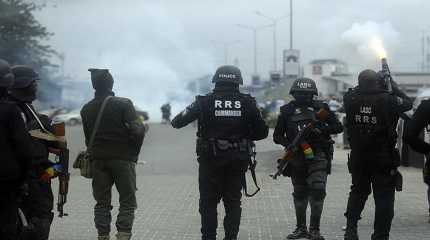
ABUJA, Nigeria (AP) — More than 100 people who died in Nigeria in 2020 during protests against police brutality will soon be buried, authorities said, prompting allegations by activists on Monday of a cover-up and calls for a new investigation.
At least 103 bodies were gathered from across the state after the protests and other clashes related to it, the top official at Lagos State’s ministry of health, Dr. Olusegun Ogboye, said in a statement after local media reported a leaked memo about the planned burial.
Ogboye said the fatalities occurred during violence in many parts of the state and not at a protest site at the Lekki toll gate, where soldiers allegedly shot protesters.
The new information about the deaths shows authorities in the West African nation are still covering up the true casualty toll from the protest and are still protecting security personnel who killed protesters, Amnesty International’s Nigeria office said as it demanded a new probe into the killings. Nigerian officials had said 51 civilians and 18 security personnel were killed during the unrest in Lagos and other parts of the country.
“Men associated with the government directly or indirectly … and sponsored thugs attacked and injured, and in some cases killed protesters. You can see the government shifting the goal post every now and then, which shows a lack of honesty,” the group’s Nigeria director, Isa Sanusi, told The Associated Press.
Thousands across Nigeria marched in October 2020 to protest the activities of the now-disbanded Special Anti-Robbery Squad, a unit accused of police brutality. In Lagos where the protest, known as #EndSARS movement, was concentrated, security forces opened fired at the Lekki Toll Gate protest venue, prompting global condemnation and an investigation that later found that dozens were shot at despite denials from authorities.
Many Nigerians and some activists questioned the decision of the Lagos government not to announce the planned burial until after news of it broke, but authorities denied any cover-up.
“Decongestion of our public morgues is a periodic and regular exercise approved by Governor Babajide Sanwo-Olu to free up space in mortuaries that have a large number of unclaimed bodies,” Ogboye said.
The 2020 protest, involving mainly young people in Africa’s most populous country, lasted nearly two weeks, climaxing on Oct. 20 when army soldiers arrived at the Lekki toll gate protest site and opened fire on youths armed only with the Nigerian flag as they sang the national anthem.
After initially denying its personnel were at the scene, the army later said soldiers only fired blanks, although an independent panel set up by the goverment found that to be false. The panel said in its report that, “The atrocious maiming and killing of unarmed, helpless and unresisting protesters, while sitting on the floor and waving their Nigerian flags, while singing the National anthem can be equated to a massacre in context.”
Oke Ridwan, a lawyer who helped fight for the release of some of the arrested protesters, said the government must prosecute those responsible for the killings. “We can’t move on from this until that is done. Everyone involved in killing Nigerian citizens must be severely punished and made known to the public,” he said.




